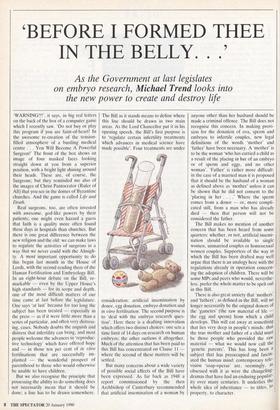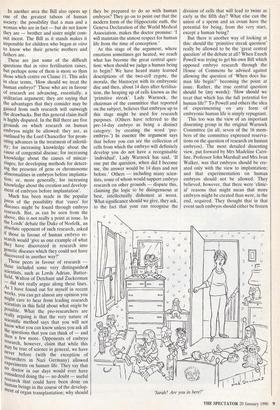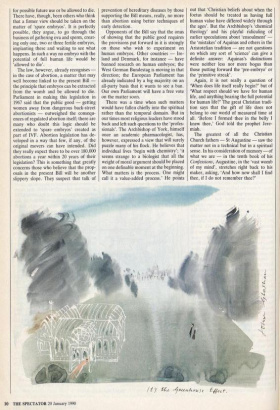`BEFORE I FORMED THEE
IN THE BELLY...'
As the Government at last legislates the new power to create and destroy life
'WARNING!!!', it says, in big red letters on the back of the box of a computer game which I recently saw. `Do not buy or play this program if you are faint-of-heart! In the awesome re-creation of the tension- filled atmosphere of a bustling medical centre . . . You Will Become A Powerful Surgeon!' The front of the box shows an image of four masked faces looking straight down at you from a superior position, with a bright light shining around their heads. These are, of course, the Surgeons; but they reminded me also of the images of Christ Pantocrator (Ruler of All) that you see in the domes of Byzantine churches. And the game is called Life and Death.
Real surgeons, too, are often invested with awesome, god-like powers by their patients; one might even hazard a guess that faith is a quality more often found these days in hospitals than churches. But there is one great difference between the new religion and the old: we can make laws to regulate the activities of surgeons in a way that we never could with the Almigh- ty. A most important opportunity to do this began last month in the House of Lords, with the second reading there of the Human Fertilisation and Embryology Bill. In an eight-hour debate on the Bill, re- markable — even by the Upper House's high standards — for its scope and depth, one of the most difficult matters of our time came at last before the legislature. One says 'at last' because for too long the subject has been treated — especially in the press — as if it were little more than a series of particular, and often very distress- ing, cases. Nobody doubts the anguish and distress that infertility can bring, and most people welcome the advances in 'reproduc- tive technology' which have offered hope and — in those ten per cent of in vitro fertilisations that are successfully im- planted — the wonderful prospect of parenthood to those who would otherwise be unable to have children.
But we also recognise the principle that possessing the ability to do something does not necessarily mean that it should he done; a line has to be drawn somewhere. The Bill as it stands means to define where this line should be drawn in two main areas. As the Lord Chancellor put it in his opening speech, the Bill's first purpose is to 'regulate certain infertility treatments which advances in medical science have made possible'. Four treatments are under
consideration: artificial insemination by donor, egg donation, embryo donation and in vitro fertilisation. The second purpose is to 'deal with the embryo research ques- tion'. Here there is a drafting innovation which offers two distinct choices: one sets a time limit of 14 days on research on human embryos; the other outlaws it altogether. Much of the attention that has been paid to this Bill has concentrated on Clause 11 — where the second of these matters will be settled.
But many concerns about a wide variety of possible social effects of the Bill have been expressed. As far back as 1948 a report commissioned by the then Archbishop of Canterbury recommended that artificial insemination of a woman by anyone other than her husband should be made a criminal offence. The Bill does not recognise this concern. In making provi- sion for the donation of ova, sperm and embryos to infertile couples, new legal definitions of the words 'mother' and 'father' have been necessary. A 'mother' is to be the woman 'who has carried a child as a result of the placing in her of an embryo or of sperm and eggs, and no other woman'. 'Father' is rather more difficult: in the case of a married man it is proposed that it should be the husband of a woman as defined above as 'mother' unless it can be shown that he did not consent to the `placing in her . . . .' Where the sperm comes from a donor — or, more compli- cated still, from a man who has already died — then that person will not be considered the father.
The Bill makes no mention of another concern that has been heard from some quarters: whether, or not, artificial insemi- nation should be available to single women, unmarried couples or homosexual women couples. Supporters of the way in which the Bill has been drafted may well argue that there is an analogy here with the regulations already in operation concern- ing the adoption of children. There will be some MPs and peers who would, neverthe- less, prefer the whole matter to be spelt out in this Bill.
There is also great anxiety that 'mothers' and 'fathers', as defined in the Bill, will no longer necessarily be the original donors of the 'gametes' (the raw material of life — the egg and sperm) from which a child develops. This will eat away at something that lies very deep in people's minds: that the true mother and father of a child must be those people who provided the raw material — what we would now call the 'genetic parents'. This has long been a subject that has preoccupied and fascin- ated the human mind: contemporary tele- vision 'soap-operas' are, seemingly, as obsessed with it as were the changeling- dramas that have had an enduring popular- ity over many centuries. It underlies the whole idea of inheritance — to titles, t° property, to character. In another area the Bill also opens up one of the greatest taboos of human society: the possibility that a man and a woman who are in fact — but do not know they are — brother and sister might com- mit incest. The Bill as it stands makes it impossible for children who began in vitro to know who their genetic mothers and fathers are.
These are just some of the difficult questions that in vitro fertilisation raises, but perhaps none of them is more so than those which centre on Clause 11. This asks in clear terms, 'How should we treat the human embryo?' Those who are in favour of research are advancing, essentially, a utilitarian argument; they are saying that the advantages that they consider may be gained from such research will outweigh the drawbacks. But this general claim itself is highly disputed. In the Bill there are five grounds on which research on human embryos might be allowed: they are, as outlined by the Lord Chancellor 'for prom- oting advances in the treatment of infertil- ity; for increasing knowledge about the cause of congenital disease; for increasing knowledge about the causes of miscar- riages; for developing methods for detect- ing the presence of gene or chromosome abnormalities in embryos before implanta- tion; or, more generally, for increasing knowledge about the creation and develop- ment of embryos before implantation'. Much has been made in the popular press of the possibility that 'cures' for diseases might be found through embryo research. But, as can be seen from the above, this is not really a point at issue. In the Lords' debate the Duke of Norfolk, an absolute opponent of such research, asked if those in favour of human embryo re- search would 'give us one example of what they have discovered in research into genetic diseases which they could not have discovered in another way?' Those peers in favour of research these included some very distinguished sFientists, such as Lords Adrian, Butter- field, Walton of Detchant and Zuckerman did not really argue along these lines. As I have found out for myself in recent weeks, you can get almost any opinion you might care to hear from leading research scientists in this field about what might be Possible. What the pro-researchers are really arguing is that the very nature of scientific method says that you will not the what you can know unless you ask all then questions that you can think of — and 'Lien a few more. Opponents of embryo research, however,• claim that while this may be true of science in general, we have never before (with the exception of researchers in Nazi Germany) allowed e_ xPeriments on human life. They say that no doctor in our days would ever have onsidered doing the — no doubt — useful research that could have been done on human beings in the course of the develop- ment of organ transplantation; why should
they be prepared to do so with human embryos? They go on to point out that the modern form of the Hippocratic oath, the Geneva Declaration of the World Medical Association, makes the doctor promise: 'I will maintain the utmost respect for human life from the time of conception.'
At this stage of the argument, where emotions sometimes get heated, we reach what has become the great central ques- tion: when should we judge a human being to begin? We have heard many learned descriptions of the two-cell zygote, the morula, the blastocyst with its embryonic disc and then, about 14 days after fertilisa- tion, the heaping up of cells known as the `primitive streak'. Lady Warnock, the chairman of the committee that reported on the subject, believes that embryos up to this stage might be used for research purposes. (Others have referred to the pre-14-day embryo as being a distinct category: by creating the word 'pre- embryo.') In essence the argument says that before you can see the collection of cells from which the embryo will definitely develop you do not have a recognisable `individual'. Lady Warnock has said, 'If one put the question, when did I become me, the answer would be 14 days and not before.' Others — including many scien- tists, some of whom would support embryo research on other grounds — dispute this, claiming the logic to be disingenuous at best, intellectually dishonest at worst. What significance should we give, they ask, to the fact that your can recognise the division of cells that will lead to twins as early as the fifth day? What else can the union of a sperm and an ovum have the potential for being, from the very start, except a human being?
But there is another way of looking at this: should the 'primitive streak question' really be allowed to be the 'great central question' of the debate at all? When Enoch Powell was trying to get his own Bill which opposed embryo research through the House of Commons he advised against allowing the question of 'When does hu- man life begin?' becoming the point at issue. Rather, the true central question should be (my words): 'How should we treat that which has the full potential for human life?' To Powell and others the idea of experimenting on any form of embryonic human life is simply repugnant.
This too was the view of an important dissenting group in the original Warnock Committee (in all, seven of the 16 mem- bers of the committee expressed reserva- tions on the question of research on human embryos). The most detailed dissenting view, put forward by Mrs Madeline Carri- line, Professor John Marshall and Mrs Jean Walker, was that embryos should be cre- ated only with the view to implantation; and that experimentation on human embryos should not be allowed. They believed, however, that there were 'clinic- al' reasons that might mean that more embryos might be created than were, in the end, required. They thought that in that event such embryos should either be frozen 'Sarah? Are you in here?' for possible future use or be allowed to die. There have, though, been others who think that a firmer view should be taken on the matter of 'spare embryos'. It is perfectly possible, they argue, to go through the business of gathering ova and sperm, creat- ing only one, two or three fertile embryos, implanting these and waiting to see what happens. In such a way no embryo with the potential of full human life would be `allowed to die'.
The law, however, already recognises in the case of abortion, a matter that may well become linked to the present Bill the principle that embryos can be extracted from the womb and be allowed to die. Parliament in making this legislation in 1967 said that the public good — getting women away from dangerous back-street abortionists — outweighed the consequ- ences of regulated abortion itself; there are many who doubt this logic should be extended to 'spare embryos' created as part of IVF. Abortion legislation has de- veloped in a way that few, if any, of the original movers can have intended. Did they really expect there to be over 180,000 abortions a year within 20 years of their legislation? This is something that greatly concerns those who believe that the prop- osals in the present Bill will be another slippery slope. They suspect that talk of prevention of hereditary diseases by those supporting the Bill means, really, no more than abortion using better techniques of early detection.
Opponents of the Bill say that the onus of showing that the public good requires the provisions put forward in it is strongly on those who wish to experiment on human embryos. Other countries — Ire- land and Denmark, for instance — have banned research on human embryos; the West Gernian Bundestag is moving in that direction; the European Parliament has already indicated by a big majority on an all-party basis that it wants to see a ban. Our own Parliament will have a free vote on the matter soon.
There was a time when such matters would have fallen chiefly into the spiritual rather than the temporal domain. But in our times most religious leaders have stood back and left such questions to the 'profes- sionals'. The Archbishop of York, himself once an academic pharmacologist, has, however, expressed a view that will surely puzzle many of his flock. He believes that individual lives 'begin with chemistry'; 'it seems strange to a biologist that all the weight of moral argument should be placed on one definable moment at the beginning. What matters is the process. One might call it a value-added process.' He points out that 'Christian beliefs about when the foetus should be treated as having full human value have differed widely through the ages'. But the Archbishop's 'chemical theology' and his playful ridiculing of earlier speculations about 'ensoulment' the 'mistakes' of Aquinas and others in the Aristotelian tradition — are not questions on which any sort of 'science' can give a definite answer: Aquinas's distinctions were neither less nor more bogus than those putting forward the 'pre-embryo' or the 'primitive streak'.
Again, it is not really a question of `When does life itself really begin?' but of 'What respect should we have for human life, and anything bearing the full potential for human life?' The great Christian tradi- tion says that the gift of life does not belong to our world of measured time at all. 'Before I formed thee in the belly I knew thee,' God told the prophet Jere- miah.
The greatest of all the Christian Church fathers — St Augustine — saw the matter not in a technical but in a spiritual sense. In his consideration of memory — of what we are — in the tenth book of his Confessions, Augustine, in the 'vast womb of my mind', stretches right back to his maker, asking, 'And how now shall I find thee, if I do not remember thee?'




















































 Previous page
Previous page